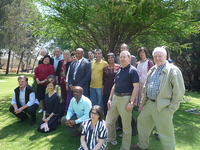National Associations in Europe
May 07, 2011
Representatives of 21 Sociological Associations took part in the meeting organized by the European Sociological Association in Paris, October 28th, 2010. ESA President Anália Torres, ESA Past President Claire Wallace and members of the ESA Executive Committee were present too. Our special guests were Jean-Michel Baer, Director of Research for Science, Economy and Society from the European Commission and Rifka Weehuizen from the European Science Foundation.
ESA has two backbones: the Research Networks and the National Associations. By statute, the National Associations play a signifi cant role in the ESA as they propose candidates for election to the ESA Executive Committee and for the post of ESA President.
This is a brief report about the characteristics of each national association, leaving for another time the main topics discussed which included the Bologna process, and the downsizing of the social sciences in the majority of European countries.
Such is the state of European national associations of sociology!
European National Associations of Sociology
- The German Sociological Association has 2500 members and offers infrastructure for collective research. Indeed, they have become quite professional in recent years and are active in promoting research in Europe.
- The Norwegian Sociological Association plays a major role in connecting people through various networks.
- The Turkish Association was founded in 1990 and has 500 members. Since Turkey has applied for European Union membership, Turkish sociologists are more focused on Western sociology.
- In Romania, there is a militant sociology, which seeks to enhance social development, leading to various policy initiatives. At the same time there is a focus on micro-social issues at the expense of global issues. The result is an isolated sociology. The number of research institutes has fallen, but they now publish a web-based review.
- The French Sociological Association is very young, only founded in 2002, but they have 1000 members and 40 different research networks.
- The Portuguese Sociological Association has 2600 members. It is a scientific association as well as a professional one. They try to bring together people who are teaching, researching, but also those working in enterprises.
- The Westermarck Society in Finland was founded in 1954, and its journal was launched in 1965.
- The Swiss Sociological Association has 550 members, about the same number for 20 years. They have 12 research committees which hold conferences in the year between ESA conferences. It is a multilingual association, and its conferences are trilingual (French, German and English). They also publish a trilingual journal.
- The statutes of the Hungarian Sociological Association have recently been changed, and now they can launch research projects of their own. They organize yearly conferences.
- In Austria, we find many ‘homemade’ careers, and a loss of identity. The Bologna process leads to fragmentation because the Bachelor’s and Master’s degrees differ considerably as far as content is concerned.
- The Spanish Federation of Sociology is linked to autonomous regional communities in Spain. There are many activities within these regions and a variety of different journals. The Federation also organizes meetings and publishes its own journal.
- Half of the British Sociological Association members and half the PhDs do not work in sociology departments. The British government has recently changed its funding policy, and there have been several large public demonstrations. Studies are becoming very expensive.
- The Italian universities are experiencing a double crisis: organizational and financial. It is diffi cult to evaluate the impact of the organizational issues, but there is a major financial crisis as far as salaries are concerned.
- Sociology in Poland is a very prestigious science. Its identity was built up during the communist period. There are more applications for MA than for BA degrees, which means that many applicants come from other disciplines, with limited sociological knowledge.
- The Vojvodinian Sociological Association is a non-profit and non-political organization. Its research projects are beset by financial problems and multicultural divisiveness. There are 25 ethnic groups.
- In Denmark, there are good salaries in all fi elds, so this causes a kind of brain drain from the academic field. Furthermore academic standards are so high that it is very diffi cult for students to enter Danish universities.
- The Macedonian Association is a small one. It is an academic association closely connected to the major universities, but it also has professional interests.
- The Albanian Institute of Sociology has 130 members and organizes national conferences every year.
- There are three sociological associations in Russia, all of them based in Moscow. Sociology enjoys a certain prestige. Sociologists are often close to policy makers.
- Sociology in Israel has been well established since 1948. Today its association is quite large; they organize a conference every year, with around 1000 people attending.
Roberto Cipriani, President of the ESA Council of National Associations












